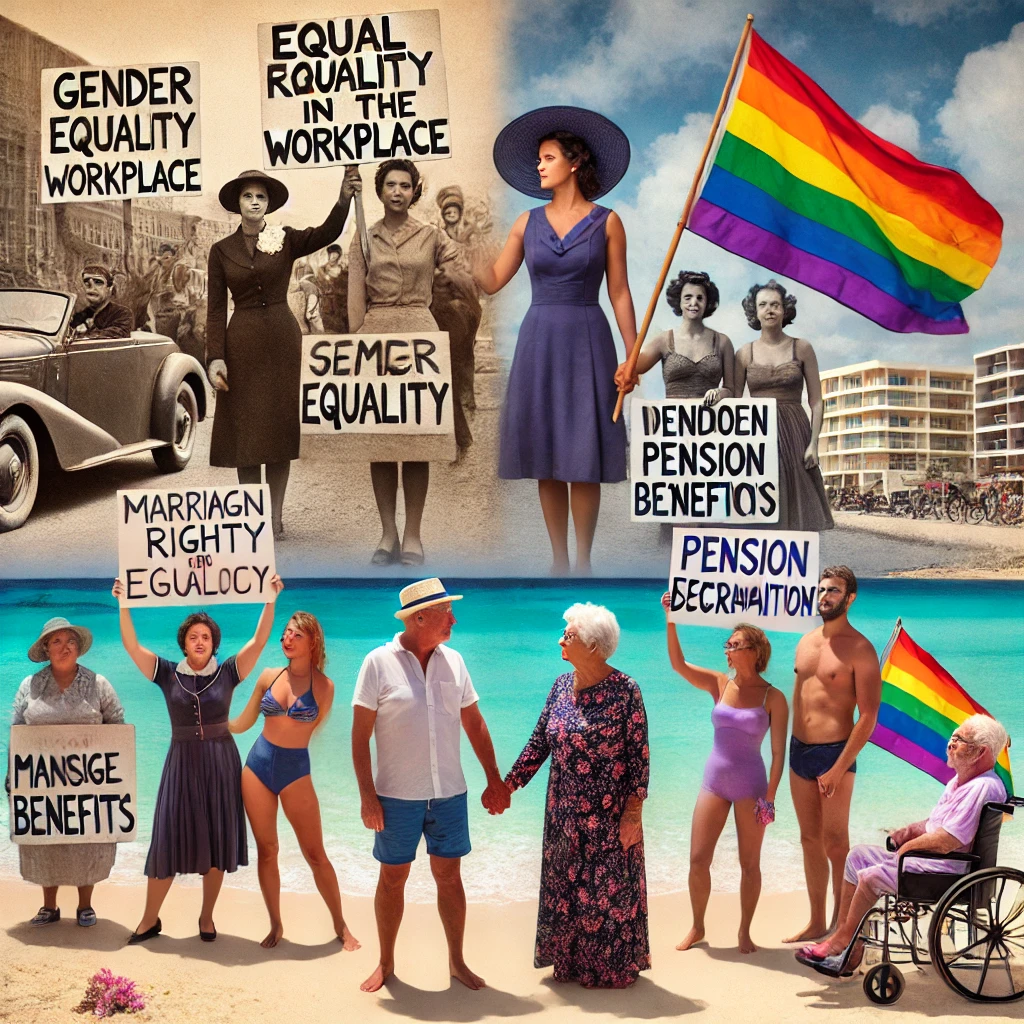SVB’s Discriminatory Practices: Another Victory for Equality
The recent Torrealba Gonzalez vs. Sociale Verzekeringsbank (SVB) case shines a harsh light on the persistence of institutional discrimination. I first learned about this case last week through the media, www.24ora.com, and it was disheartening to read that the Social Security Bank SVB had denied a widower’s pension to Nolberto Torrealba Gonzalez, who lost his husband, Jean Baiz, in 2022. The refusal struck me deeply, prompting me to obtain a copy of the verdict so I could understand the reasoning behind this decision better and share it with you on the gender equality struggle.
Wrong and Strong
Despite clear legal precedent affirming the rights of same-sex couples by our Joined Court and the Supreme Court, the SVB clung to outdated and discriminatory interpretations of marriage laws to justify its refusal. The SVB argued that under the Aruban Widower and Orphans Pension (AWW), same-sex marriages did not qualify for pension benefits, effectively excluding Torrealba Gonzalez from receiving the widow’s pension. This reasoning relied on an outdated legal definition that only recognized marriages between men and women. This is despite SVB’s website clearly stating:
“The Widow and Orphan Insurance (Algemene Wezen- en Weduwenverzekering of AWW) is an insurance for all persons that covers the financial consequences of the passing away of a spouse who is an insured person. When a person becomes a widow/er, they are eligible to receive a widow’s pension under the AWW law.
The Motive?
It’s hard not to question whether financial motivations influenced the SVB’s stance. After all, the SVB would have benefited financially if the court had not overturned its decision. Baiz paid premiums into the AWW system like all insured individuals. Yet, if the SVB had succeeded in denying the pension, it would have avoided paying out benefits to the surviving spouse. This raises the possibility that the SVB was more concerned with protecting its financial resources than upholding the rights of those it insured. By exploiting an outdated legal argument, the SVB stood to save money by collecting premiums without having to pay out benefits when they became due. This raises a troubling question: was this purely a legal argument, or was it another example of an insurer trying to skimp on its obligations? The SVB case is, unfortunately, not an isolated incident. It mirrors the broader struggle for equality across our island, especially in the recent Supreme Court ruling on same-sex marriage. While I won’t go into detail here, I invite you to read my analysis of the Supreme Court’s decisions on same-sex marriage in Aruba and Curaçao. Previously, I wrote about Equality is of to the Supreme Court and before that, Supreme Court Hearing On Same-Sex Marriage In Aruba And Curaçao: What Happened And What Lies Ahead? These rulings reinforce the message that discrimination has no place in our laws – or in our institutions. Recently, I also questioned Constitutional Amendments For A Referendum?.
Historical note
While researching, I found an article reporting that Baiz and Torrealba Gonzalez were the first same-sex couple to marry in Bonaire. Baiz can be considered a pioneer, and his legacy continues with the SVB case.
My Father’s Storytelling
Unfortunately, discriminatory practices by institutions are nothing new. This case coincided with my father’s story about the challenges people faced just a few decades ago. One such story involved the late mrs. Tina Winterdaal-Lopez. She worked in the police administration in the late 1950s. In those days, a woman working for the government as a civil servant was not allowed to work once she married! She and others were not permitted to work because they were married. In her case, it was different. Tina oversaw all correspondence, a critical task no one else could perform. Because the police needed her, she had to apply for a special dispensation from the Minister of Justice – an exception granted only because the police had no alternative.
My dad knew the story because, at that time, he was fresh out of school and also worked for the administration of the police department. Before Tina retired, my father was tasked to work side-by-side with her to take over the job.
I know her son, Edsel Lopez; we worked in the same building for years. Edsel is a CPA and managing partner at PFk Aruba. His youngest daughter is a friend of my youngest son, Gavin. I met his mom once or twice at birthday parties, but I had never known about Tina’s story until my dad told me about it. Learning about her experience made me reflect on how deeply entrenched discrimination was in that era, even affecting people in our communities. The obstacles Tina faced to maintain her job while navigating the restrictions placed on married women highlight how systemic gender bias once dictated the lives of so many.
My Storytelling
I have also encountered a case in my legal practice involving a woman who, due to outdated nationality laws, automatically lost her Dutch citizenship after marrying a foreign man. Can you imagine losing one’s citizenship just because of love? Meanwhile, Dutchmen who married foreign women faced no such consequences. These laws, much like the policies we see today in cases like Torrealba Gonzalez, treated women as second-class citizens, denying them rights based solely on their gender or marital status.

Moving Forward: Accountability and Inclusion
The Torrealba Gonzalez case isn’t just about one man’s (or woman’s) pension; it reflects the larger struggle against institutionalized discrimination. The fact that the SVB argued its case based on an outdated legal definition shows a deliberate refusal to adapt to evolving standards of equality. Worse, it suggests that financial considerations may have driven the decision, with the SVB looking to save costs by denying benefits. This behavior is unacceptable, and the leadership of the SVB must be held accountable for failing to uphold the values of fairness and equality that our Constitution demands. The director of the SVB, Edwin Jacobs should explain to the community why these actions were taken and, more importantly, what will be done to stop this discriminatory practice.
Discrimination – whether based on sexual orientation, gender, or nationality – must be challenged at every level. Legal victories like this are critical but only part of the solution. Institutions must take proactive measures to eliminate discrimination rather than waiting for the courts to force their hand.
As we move forward, it’s essential to stay vigilant. Equality is not just a legal issue – it’s a moral one. Institutions like the SVB must be held to a higher standard, and we as a community must demand better.
For more thoughts on these issues and others, I encourage you to visit www.lincolngomez.com, where I continue to write about legal matters, equality, and justice.












